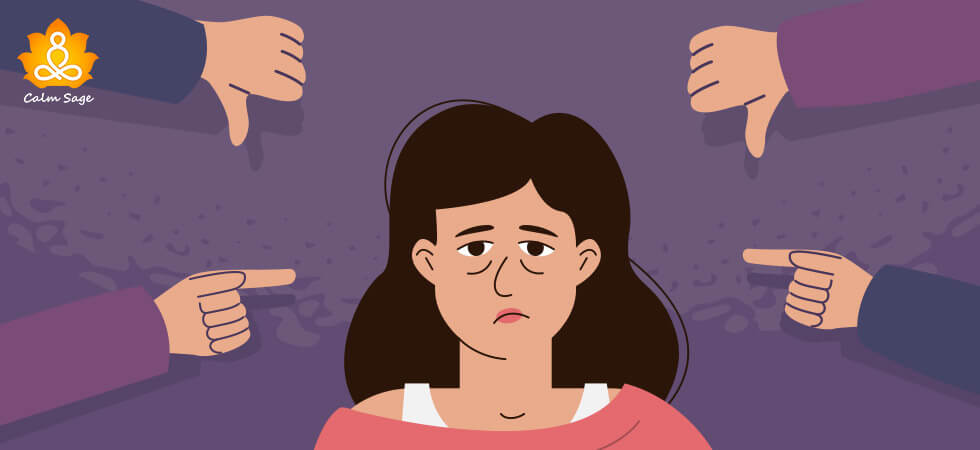5 Healthy Yet Effective Ways to Deal With a Critical Person

There are always times when we are given constructive feedback (which can be good for our personal growth and progress), but then there are times when we are faced with criticism (and not constructively either). Dealing with feedback and criticism is a part of our growth.
Even so, when criticism is anything but constructive, it can make us feel judged and rejected. When this happens, our reaction usually is to listen and then walk away, however, in some cases, this reaction can worsen the situation.
So, how to deal with criticism, or better yet, with someone who criticizes you for everything you do?
In this article, I’ve listed 5 healthy and effective ways you can deal with a critical person. But first, let’s learn why a person constantly criticizes others. Is it just because they feel insecure or is there another reason behind their criticism?
Why Does a Person Always Criticize?
Psychologists believe that when someone criticizes everything you do, there’s a chance that it’s more about them than you. Sometimes, the criticism is subconscious, and a critical person isn’t even aware that they are being critical.
Others tend to believe that a critical person feels anxious and this causes them to think (subconsciously mostly) that constantly criticizing others can help them feel in control of their anxiety.
Other common reasons why someone always criticizes you can include;
- Low self-esteem
- Lack of emotional security
- Being constantly criticized in their childhood
- Having a sense of superiority
Now, how do you recognize a critical person? Check out these signs of a critical person!
Signs of a Critical Person
To recognize a critical person, here are some of the most common signs that they might show. Keep a lookout for these signs;
- They constantly second-guess themselves
- They constantly complain and judge others (even themselves)
- They take everything too seriously
- They have extraordinary expectations from others. Anything lesser than that is not good enough for them
- They can’t take a compliment and dismiss them just as easily
- They are hard on themselves and believe that if they stop being pushy, everything in their life will fall apart
- They feel irritated and snappish when things don’t go the way they want
- They are a pessimistic person
- They hesitate to express their opinion
Being constantly criticized can leave psychological effects on the person being criticized and the one doing the criticism too.
Psychological effects of constant criticism can include the development of disorders such as;
- Depression
- Schizophrenia
- Anxiety disorders
- Chronic stress
- Loneliness
How to Deal With a Critical Person?
Here are healthy tips to deal with a hypercritical personality;
1. See Who’s Criticizing You,
The first thing you need to understand is who is the one criticizing you. Are they family? Are they close friends? Or are they coworkers? Before you let the criticism wash over you, consider how important their criticism is to you.
Try to keep in mind that this person might also not know the topic that they are criticizing you for and can have other reasons for being hypercritical.
2. Avoid Taking Criticism to Heart
When someone criticizes you, you need to remember to not take it personally. Criticism can just be a reflection of the other person’s personality rather than about you. Sometimes, a person is critical because they are insecure, and they believe that projecting their insecurities onto you can help them feel better.
Here’s an example; If a coworker is insecure about their presentation, then they are likely to find mistakes with yours.
3. Pause And Consider The Situation For a Moment
When someone criticizes us, our first reaction is to defend ourselves and respond with anger. When our feelings are hurt, more often than not, we tend to respond angrily and get defensive. This often causes arguments and confrontations. So, when met with criticism, pause, take a breath, and think about it.
Walk away from the situation for a moment and try to see things through a different lens. Process what the hypercritical person’s words meant and how you should respond. This will avoid any unnecessary arguments.
4. Use The Gray Rock Method
Hypercritical persons always want a reaction from you and if you believe it’s happening to you try the gray rock method. The gray rock method involves giving uninteresting reactions or boring responses so that the critical person loses interest.
Here are some of the common responses you can give instead;
- “Thanks for your input. I’ll look into it.”
- “I heard you. I’ll consider your words.”
- “Good point. It’s something to be noticed.”
Pro-tip: You don’t always have to mean these words. Just let them be.
5. Show Some Empathy Towards Them
Instead of brushing the other person off, try to show some empathy. As I mentioned before, their hypercritical behavior may stem from their own insecurities so there’s a chance that they’ve been hurt and rejected in the past. Showing them empathy can help them feel less insecure and less critical of themselves.
Try to look at a situation from their perspective. This might help you understand why they are always criticizing others. Be as compassionate as you can be to the person as well. Kindness is, after all, the biggest weapon.
Final Thoughts…
When you’re faced with constant criticism, it can’t be easy on your mental and emotional health. Our first response to criticism is being defensive to protect our self-esteem but sometimes, it can worsen the situation and sow the seeds of confrontation.
Instead of getting defensive, try to consider who is the one doing the criticizing or if there is a reason behind their hypercritical personality. Considering these things might help you change your perspective and easily deal with a critical person.
If you still need additional help and support in dealing with a hypercritical person, you can connect with a therapist. They can teach you effective strategies to deal with a critical person and how you can set healthy boundaries to protect yourself from all the negativity and toxicity.
I hope this article helps you respond to a critical person in a way they aren’t expecting; With Love!
For more, you can write to us at info@calmsage.com or DM us on social media. You can also share your thoughts and tips in the comments below.
Take care!




















